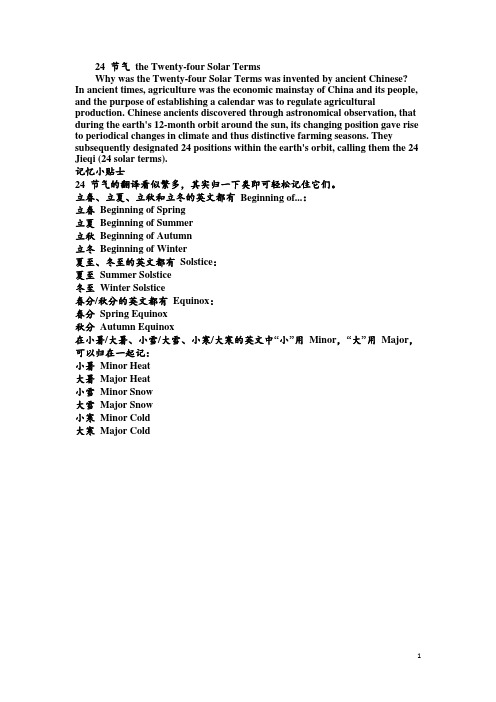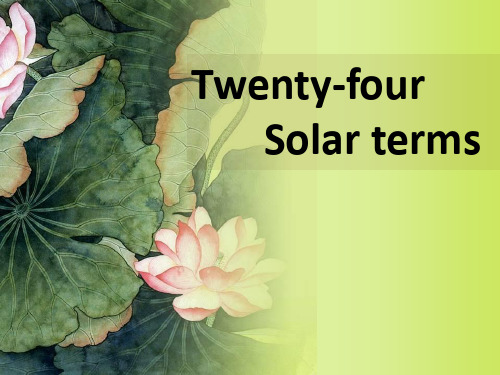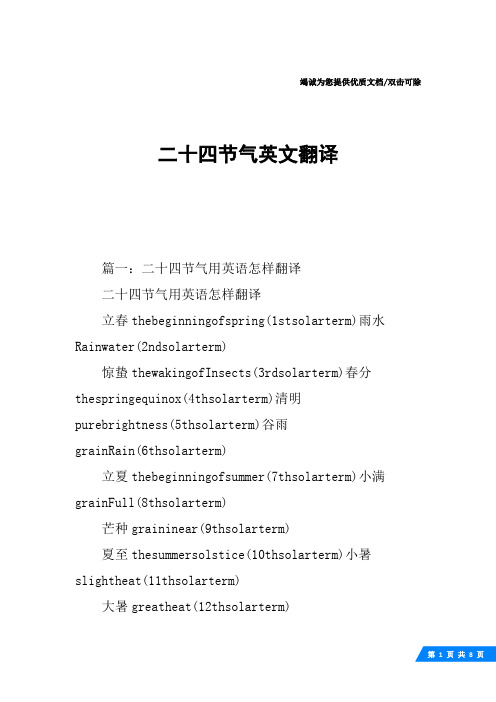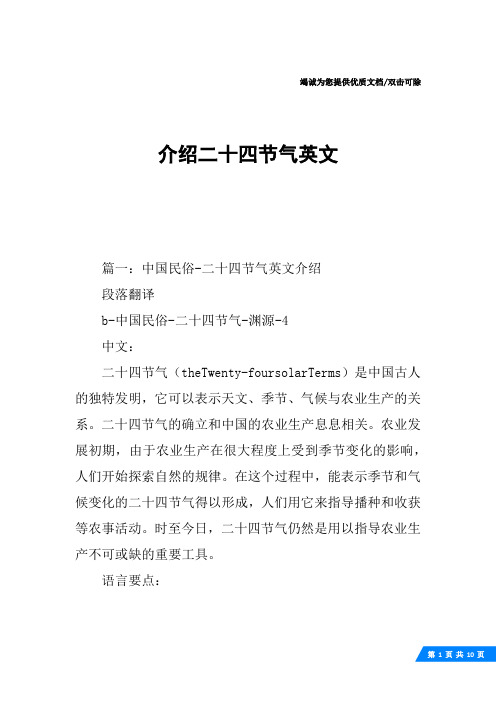二十四节气英文介绍
24 节气 the Twenty-four Solar Terms 中学英语

24 节气the Twenty-four Solar TermsWhy was the Twenty-four Solar Terms was invented by ancient Chinese? In ancient times, agriculture was the economic mainstay of China and its people, and the purpose of establishing a calendar was to regulate agricultural production. Chinese ancients discovered through astronomical observation, that during the earth's 12-month orbit around the sun, its changing position gave rise to periodical changes in climate and thus distinctive farming seasons. They subsequently designated 24 positions within the earth's orbit, calling them the 24 Jieqi (24 solar terms).记忆小贴士24 节气的翻译看似繁多,其实归一下类即可轻松记住它们。
立春、立夏、立秋和立冬的英文都有Beginning of...:立春Beginning of Spring立夏Beginning of Summer立秋Beginning of Autumn立冬Beginning of Winter夏至、冬至的英文都有Solstice:夏至Summer Solstice冬至Winter Solstice春分/秋分的英文都有Equinox:春分Spring Equinox秋分Autumn Equinox在小暑/大暑、小雪/大雪、小寒/大寒的英文中“小”用Minor,“大”用Major,可以归在一起记:小暑Minor Heat大暑Major Heat小雪Minor Snow大雪Major Snow小寒Minor Cold大寒Major Cold对于二十四节气,联合国教科文组织是这样介绍的:China—The Twenty-Four Solar Terms, knowledge of time and practices developed in China through observation of the sun’s annual motionThe ancient Chinese divided the sun’s annual circular motion into 24 segments, calling each segment a specific ‘Solar Term’. The criteria for its formulation were developed through the observation of changes of seasons, astronomy and other natural phenomena. The element remains of particular importance to farmers for guiding their practices. Some rituals and festivities are associated with the terms, which have contributed to the community’s cultural identity. Knowledge of the element is transmitted through formal and informal means of education.中国:二十四节气,中国人通过观察太阳周年运动而形成的时间知识体系及其实践中国古人通过观察太阳周年运动将太阳周年运动轨迹划分为24等份,每一等份为一个“节气”,统称“二十四节气”。
二十四节气英文介绍

Tale said in order to avoid hurt from cold food, some exercises are benefits to our body in Pure Brightness.
Grain Rain
Grain Rain
• Around April 20th each year • Significance of this name: • Grains will grow well with
春 分
The Spring
Equinox
The Spring Equinox
• Around March 21th each year
• Significance of this name:
•
Length of day and night
becomes nearly equal
• The sun reaches the celestial
during the fast growth.
Celestial: adj. 中国的 celestial longitude 黄经(度)
Health preserving in the Beginning of Spring
• Following the nature and protecting the Yangqi in body.
• 立夏 Summer begins • 小满 Grain buds • 芒种 Grain in ear • 夏至 Summer solstice • 小暑 Slight heat • 大暑 Great heat
立 夏
Summer begins
Summer begins( 5月5-6日)
【51Talk-英文介绍中国非遗文化】中国非物质文化遗产:二十四节气

中国非物质文化遗产:二十四节气China’s ’24 solar terms’ is a knowledge system and social practice formed through observations of the sun’s annual motion, and cognition of the year’s changes in season, climate and phenology.中国的二十四节气是一种知识体系和社会实践习惯,通过观察太阳的周年运动,以及认识一年在季节、气候和物候方面的变化而形成。
The ancient Chinese divided the sun’s annual circular motion into 24 segments. Each segment was called a specific ‘Solar Term’.The 24 terms include Start of Spring, Rain Water, Awakening of Insects, Spring Equinox, Clear and Bright, Grain Rain, Start of Summer, Grain Buds, Grain in Ear, Summer Solstice, Minor Heat, Major Heat, Start of Autumn, End of Heat, White Dew, Autumn Equinox, Cold Dew, Frost’s Descent, Start of Winter, Minor Snow, Major Snow, Winter Solstice, Minor Cold and Major Cold.中国古人将太阳周年运动轨迹划分为24等份,每一等份为一个“节气”。
二十四节气包括立春、雨水、惊蛰、春分、清明、谷雨、立夏、小满、芒种、夏至、小暑、大暑、立秋、处暑、白露、秋分、寒露、霜降、立冬、小雪、大雪、冬至、小寒、大寒。
二十四节气英文翻译

竭诚为您提供优质文档/双击可除二十四节气英文翻译篇一:二十四节气用英语怎样翻译二十四节气用英语怎样翻译立春thebeginningofspring(1stsolarterm)雨水Rainwater(2ndsolarterm)惊蛰thewakingofInsects(3rdsolarterm)春分thespringequinox(4thsolarterm)清明purebrightness(5thsolarterm)谷雨grainRain(6thsolarterm)立夏thebeginningofsummer(7thsolarterm)小满grainFull(8thsolarterm)芒种graininear(9thsolarterm)夏至thesummersolstice(10thsolarterm)小暑slightheat(11thsolarterm)大暑greatheat(12thsolarterm)立秋thebeginningofAutumn(13thsolarterm)处暑theLimitofheat(14thsolarterm)白露whiteDew(15thsolarterm)秋分theAutumnalequinox(16thsolarterm)寒露coldDew(17thsolarterm)霜降Frost′sdescent(18thsolarterm)立冬thebeginningofwinter(19thsolarterm)小雪slightsnow(20thsolarterm)大雪greatsnow(21stsolarterm)冬至thewintersolstice(22ndsolarterm)小寒slightcold(23rdsolarterm)大寒greatcold(24thsolarterm)篇二:二十四节气中英文对照二十四节气中英文对照二十四节气是中国古代订立的一种用来指导农事的补充历法,是中国古代汉族劳动人民长期经验的积累和智慧的结晶。
24节气 英文讲解

24节气英文讲解二十四节气,英文叫做24 solar terms,是中国古代人民总结出来的一套时间体系,它反映了中国气候的变化和农事活动的规律。
立春(Start of Spring):标志着春天的开始,气温逐渐升高,天气变暖,植物开始萌芽。
雨水(Rain Water):气温进一步升高,春雨开始降落,滋润大地,为春季农作物生长提供了必要的水分。
惊蛰(Waking of Insects):随着气温的升高,冬眠的昆虫开始苏醒过来,开始了新的生命活动。
春分(Vernal Equinox):春分时节,昼夜长短相等,天气变得更加温暖,春暖花开,万物复苏。
清明(Pure Brightness):天气变得更为明朗,草木葱绿,人们会去祭祖扫墓,表达对先人的怀念和敬意。
谷雨(Grain Rain):春雨较多,有利于谷物生长和成熟。
立夏(Start of Summer):标志着夏季的开始,气温逐渐升高,夏季作物开始生长。
小满(Lesser Fullness of Grain):夏季作物开始成熟,满园绿色,人们期待着丰收的到来。
芒种(Grain in Ear):芒种时节,天气变得炎热,农作物生长迅速,需要充足的阳光和水分。
夏至(Summer Solstice):夏至时节,白天最长,夜晚最短,天气最为炎热。
小暑(Lesser Heat):气温开始逐渐下降,天气变得较为炎热,但相较于夏至已经有所缓解。
大暑(Greater Heat):大暑时节,天气最为炎热,但也意味着夏季即将过去。
立秋(Start of Autumn):立秋时节,天气开始逐渐转凉,秋季作物开始生长。
处暑(End of Heat):处暑时节,炎热的天气已经过去,气温逐渐下降。
白露(White Dew):白露时节,天气变得更为凉爽,清晨和夜晚常常会形成雾气。
秋分(Autumnal Equinox):秋分时节,昼夜长短相等,天气变得更加凉爽。
寒露(Cold Dew):寒露时节,天气变得更为凉爽,秋季作物开始成熟。
介绍二十四节气英文

竭诚为您提供优质文档/双击可除介绍二十四节气英文篇一:中国民俗-二十四节气英文介绍段落翻译b-中国民俗-二十四节气-渊源-4中文:二十四节气(theTwenty-foursolarTerms)是中国古人的独特发明,它可以表示天文、季节、气候与农业生产的关系。
二十四节气的确立和中国的农业生产息息相关。
农业发展初期,由于农业生产在很大程度上受到季节变化的影响,人们开始探索自然的规律。
在这个过程中,能表示季节和气候变化的二十四节气得以形成,人们用它来指导播种和收获等农事活动。
时至今日,二十四节气仍然是用以指导农业生产不可或缺的重要工具。
语言要点:establishment;becloselyassociatedwith;attheinitials tageof;behighlysubjectto;comeintobeing;todate;funct ionas;indispensable译文:TheTwenty-foursolarTermsshowtherelationshipbetweent heuniverse,seasons,climateandagriculture,whichisaun iquecreationbychineseancestors.Itsestablishmentwasc loselyassociatedwithchineseagriculturalproduction.A ttheinitialstageofagriculturaldevelopment,peoplebeg antoexplorerulesofnaturesinceagriculturalproduction washighlysubjecttoseasonalchanges.Thus,theTwenty-fo ursolarTermsthatcanindicatethechangesofseasonsandcl imatecameintobeing,andtheywereusedtoguidesowing,har vestingandotheragriculturalactivities.Todate,ithasf unctionedasanindispensabletooltoguidetheagricultura lproductioninchina.篇二:二十四节气的英文表达立春thebeginningofspring(1stsolarterm)雨水Rainwater(2ndsolarterm)惊蛰thewakingofInsects(3rdsolarterm)春分thespringequinox(4thsolarterm)清明purebrightness(5thsolarterm)谷雨grainRain(6thsolarterm)立夏thebeginningofsummer(7thsolarterm)小满grainFull(8thsolarterm)芒种graininear(9thsolarterm)夏至thesummersolstice(10thsolarterm)小暑slightheat(11thsolarterm)大暑greatheat(12thsolarterm)立秋thebeginningofAutumn(13thsolarterm)处暑theLimitofheat(14thsolarterm)白露whiteDew(15thsolarterm)秋分theAutumnalequinox(16thsolarterm)寒露coldDew(17thsolarterm)霜降Frost′sdescent(18thsolarterm)立冬thebeginningofwinter(19thsolarterm)小雪slightsnow(20thsolarterm)大雪greatsnow(21stsolarterm)冬至thewintersolstice(22ndsolarterm)小寒slightcold(23rdsolarterm)大寒greatcold(24thsolarterm)篇三:24节气英语词汇二十四节气二十四节气The24solarTerms 立春springbegins.雨水Therains.惊蛰Insectsawaken.春分Vernalequinox清明clearandbright.谷雨grainrain.立夏summerbegins.小满grainbuds.芒种graininear.夏至summersolstice.小暑slightheat.大暑greatheat.立秋Autumnbegins.处暑stoppingtheheat.白露whitedews.秋分Autumnequinox.寒露colddews.霜降hoar-frostfalls.立冬winterbegins.小雪Lightsnow.大雪heavysnow.冬至wintersolstice.小寒slightcold.大寒greatcold城市的常见英语词汇centreofpopulation城市city城capital首都metropolis大都市centre市中心(美作:center) shoppingcentre商业区municipality市政当局municipal市的,市政的district区residentialarea居民区,住宅区urban市区的suburb近郊区outskirts郊区slums贫民窟,贫民区shantytown贫民区village村hamlet小村hole,dump狭小破旧的住房locality所在地chinesequarter唐人街extension范围,扩展house房子building楼房skyscraper摩天楼flat居住单元,套房shop,store商店departmentstores百货公司bazaar,bazaar市场market市场,集市junkshop旧货店newsstand报摊commodityexchange商品交易所stockexchange股票交易所townhall市政厅Lawcourt法院church教堂cathedral大教堂chapel小礼拜堂cemetery墓地,公墓grave,tomb坟,墓school学校university大学library图书馆theatre剧院(美作:theater) museum博物馆zoologicalgarden动物园fairground,funfair游乐园stadium体育场generalpostoffice邮局station车站artmuseum美术馆artgallery画廊botanicalgarden植物园monument纪念碑publictelephone公共电话publiclavatory公共厕所nationalhighway国道trafficlight交通灯barracks兵营标点符号和运算符号.period句号,comma逗号:colon冒号;semicolon分号!exclamation惊叹号?questionmark问号 ̄hyphen连字符apostrophe省略号;所有格符号—dash破折号??singlequotationmarks单引号“”doublequotationmarks双引号()parentheses圆括号[]squarebrackets方括号《》Frenchquotes法文引号;书名号...ellipsis省略号¨tandemcolon双点号"ditto同上‖parallel双线号/virgule斜线号&ampersand=and~swungdash代字号section;division分节号→arrow箭号;参见号+plus加号;正号-minus减号;负号±plusorminus正负号×ismultipliedby乘号÷isdividedby除号=isequalto等于号≠isnotequalto不等于号≡isequivalentto全等于号≌isequaltoorapproximatelyequalto等于或约等于号≈isapproximatelyequalto约等于号<islessthan小于号>ismorethan大于号≮isnotlessthan不小于号≯isnotmorethan不大于号≤islessthanorequalto小于或等于号≥ismorethanorequalto大于或等于号%percent百分之…‰permill千分之…∞infinity无限大号∝variesas与…成比例√(square)root平方根∵since;because因为∴hence所以∷equals,as(proportion)等于,成比例∠angle角?semicircle半圆?circle圆○circumference圆周πpi圆周率△triangle三角形?perpendicularto垂直于∪unionof并,合集∩intersectionof交,通集∫theintegralof…的积分∑(sigma)summationof总和°degree度′minute分″second秒#number…号℃celsiussystem摄氏度@at单价。
二十四气节英文

二十四节气The 24 Solar Terms:立春Spring begins.雨水The rains.惊蛰Insects awaken.春分Vernal Equinox清明Clear and bright.谷雨Grain rain.立夏Summer begins.小满Grain buds.芒种Grain in ear.夏至Summer solstice.小暑Slight heat.大暑Great heat.立秋Autumn begins.处暑Stopping the heat.白露White dews.秋分Autumn Equinox.寒露Cold dews.霜降Hoar-frost falls.立冬Winter begins.小雪Light snow.大雪Heavy snow.冬至Winter Solstice.小寒Slight cold.大寒Great cold以下无正文仅供个人用于学习、研究;不得用于商业用途。
For personal use only in study and research; not for commercial use.仅供个人用于学习、研究;不得用于商业用途。
Nur für den persönlichen für Studien, Forschung, zu kommerziellen Zwecken verwendet werden.Pour l 'étude et la recherche uniquement à des fins personnelles; pas à des fins commerciales.仅供个人用于学习、研究;不得用于商业用途。
толькодля людей, которые используются для обучения, исследований и не должны использоваться в коммерческих целях.For personal use only in study and research; not for commercial use。
中国传统二十四节气之霜降英文介绍

月落乌啼霜满天(At moonset cry the crows, streaking the frosty sky)
与“豺祭兽”十分类似的,是在霜降这一天,古人将举行一场盛大 的阅兵仪式,祭奠旗纛(dào)之神。纛是用鸟羽或者牛尾装饰的 大旗。旗纛是军魂,是主帅的象征。
月落乌啼霜满天(At moonset cry the crows, streaking the frosty sky)
霜降登高
霜降时节,枫叶尽染。登至高处极目远眺,令人心旷神怡,阴霾、 悲秋的情绪随之隐没,心身感到极大的愉悦和放松。
霜降·民俗(Frost's Descent · Folk custom)
Enjoy the chrysanthemums when the frost descends
In ancient times, there is a saying that "frost plays chrysanthemum open", and appreciating chrysanthemums is the elegant thing of frost's descent. "When frost descends, only this grass is flourishing", chrysanthemum was regarded by the ancients as "the grass of waiting time", has unusual cultural significance, and is considered to be a "longevity guest", an old grass, and a symbol of vitality.
